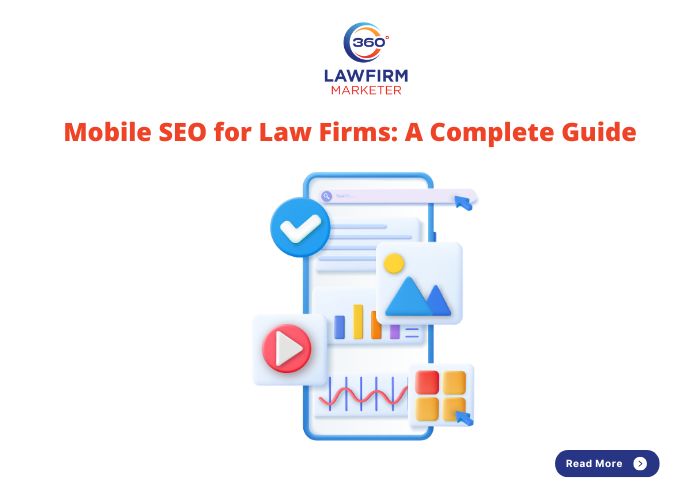Mobile SEO for Law Firms: A Complete Guide

Is your law firm’s website struggling to bring in qualified traffic? The issue may not be your content or your credentials, it might be your mobile SEO. As a leading Law Firm SEO Company, we know that mobile SEO is the practice of optimizing your website for users on smartphones and tablets, ensuring it performs well in mobile search results. With Google’s mobile-first indexing and the rise in mobile web usage, a desktop-only SEO strategy no longer cuts it. Let’s explore how mobile SEO directly impacts your law firm’s visibility and what you can do to stay ahead.
Why Mobile SEO Is Crucial for Law Firms in 2025?
According to Statistics, mobile users are expected to hit 7.49 billion globally by 2025. Currently, more than 60% of online searches happen on mobile devices. This means the majority of potential clients looking for legal help are doing so from their phones.
Google now uses mobile-first indexing, which means it primarily uses the mobile version of your website to determine how you rank in search results. If your site isn’t optimized for mobile, your search rankings and client acquisition could take a major hit.
What Is Mobile SEO?
Mobile SEO ensures your law firm’s website is accessible, fast, and easy to use on smartphones and tablets. Key elements include :
Responsive Design: Automatically adapts your site layout for different screen sizes.
Page Speed: Ensures your site loads quickly on mobile connections.
Mobile UX: Prioritizes intuitive navigation and readability on small screens.
Now, let’s dive into the core components of a strong mobile SEO strategy for law firms.
1. Responsive Design
Responsive design ensures your website looks and functions properly on every device. Without it, users will face frustrating layouts, tiny text, or buttons they can’t click which can send them running to a competitor.
Make sure your site layout, images, and content automatically adjust to screen size.
Use a flexible grid system and mobile-friendly menus to enhance accessibility.
2. Fast Mobile Load Times
Speed matters, especially on mobile. If your site takes more than a few seconds to load, most users will leave before they even see your content.
Boost your mobile speed by:
Compressing images.
Minimizing redirects.
Leveraging a Content Delivery Network (CDN).
Fast-loading websites rank better and keep users engaged longer.
3. Mobile-Friendly Content
Think of how people read on their phones like quick glances, short attention spans, and limited space. Your content must reflect that.
Tips for mobile content:
Position CTAs (like “Schedule a Consultation”) within thumb’s reach.
Use short paragraphs and bullet points.
Choose large, readable fonts.
4. Structured Data (Schema Markup)
Implementing schema markup helps search engines understand your site’s content. It can also generate rich results such as star ratings or FAQs on mobile SERPs, making your listings more clickable.
Law firms can use schema to highlight :
Attorney bios
Practice areas
Client reviews
Contact information
5. Avoid Intrusive Pop-Ups
Google penalizes sites with intrusive interstitials on mobile. While capturing leads is important, obtrusive pop-ups can ruin the user experience.
Instead:
- Use slide-in CTAs or sticky banners.
- Prioritize subtlety and timing.
6. Optimize Mobile Navigation
Clear, intuitive navigation is essential for mobile visitors. If potential clients can’t find your Practice Areas or Contact Info within a few taps, they’ll bounce.
Mobile navigation must-haves:
- Sticky menu bar
- Click-to-call buttons
- Quick access to key pages (Consultation Form, FAQs, Testimonials)
Test your navigation from a user’s perspective can someone find what they need in under 30 seconds?
7. Voice Search Optimization
With the rise of virtual assistants, voice search is a growing trend. Optimize for it by using long-tail keywords and natural language phrases like:
“What’s the best personal injury lawyer near me?”
These phrases match how real people talk, helping you capture voice-driven queries.
8. Meta Tags for Mobile SERPs
Your title tags and meta descriptions must fit mobile screen widths. If they’re too long, they’ll be truncated.
Best practices:
- Keep title tags under 60 characters.
- Limit meta descriptions to around 160 characters.
- Include a clear benefit or CTA to entice clicks.
How to Check Your Mobile SEO Health?
Use these tools to monitor and improve mobile performance :
Google Search Console: Flags mobile usability issues.
PageSpeed Insights: Analyzes load times with actionable tips.
Lighthouse: Evaluates SEO, performance, and accessibility.
Regular checkups ensure your site stays optimized and competitive.
Frequently Asked Questions (FAQs)
1. What does mobile-first indexing mean for law firms?
Mobile-first indexing means that Google primarily uses the mobile version of your website to determine how it ranks in search results. For law firms, this means your mobile site must be just as comprehensive, fast, and user-friendly as the desktop version—or better—to maintain visibility online.
2. How can I tell if my law firm’s website is mobile-friendly?
You can test your website’s mobile-friendliness using tools like Google’s Mobile-Friendly Test or Search Console’s Mobile Usability report. These tools identify issues such as small text, unclickable buttons, or slow load times that affect mobile users.
3. Is having a responsive design enough for good mobile SEO?
Responsive design is a crucial first step, but it’s not the only factor. Your law firm also needs to focus on page speed, mobile navigation, structured data, content readability, and avoiding intrusive pop-ups to ensure strong mobile performance.
4. Why is mobile SEO important for local searches?
Many legal clients search for services “near me” on their phones. Mobile SEO ensures your law firm shows up in local search results with features like click-to-call buttons, map listings, and location-based keywords, helping potential clients contact you quickly.
5. Can mobile SEO really help generate more leads for my law firm?
Absolutely. A fast, easy-to-navigate, and mobile-optimized site improves the user experience, encourages potential clients to stay longer, and increases the chances they’ll contact you. Combined with local and voice search optimization, mobile SEO is one of the most effective ways to attract qualified leads.
Conclusion : Make Mobile SEO a Priority, Not an Afterthought
Your law firm’s next client is likely searching on a phone. If your site isn’t optimized for that experience, you’re losing visibility, credibility, and revenue. That’s where professional Law Firm SEO Services comes in, ensuring your website delivers a seamless, fast, and informative experience that drives conversions, whether someone’s at home, in traffic, or walking into court.
Ready to Elevate Your Law Firm’s Mobile Presence?
360 LawFirm Marketer specializes in helping legal practices thrive online. Contact us today to learn how we can optimize your site for mobile users and turn traffic into leads.
Contact Us | Schedule a Free Consultation




